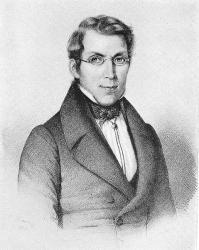|
Short Name: |
Alexandre Rodolphe Vinet |
|
Full Name: |
Vinet, Alexandre Rodolphe, 1797-1847 |
|
Birth Year: |
1797 |
|
Death Year: |
1847 |
Vinet, Alexandre Rodolphe, born June 12, 1799, [sic 1797] at Ouchy, near Lausanne. His father, a man of somewhat stern religion, was schoolmaster of the village, and held a small appointment in the Canton du Vaud, Alexandre was appointed Professor of the French language at the gymnasium of Basle, at the age of 20, and occupied this office, with same work for the University, for twenty years. In 1819 he was called to the ministry, and married. At first opposed to the movement of the Réveil a deeper knowledge of its principles and deep sympathy with the persecution of its leaders, drew him heartily to its side. His pen was fearlessly used in defence of toleration (Du respect des opinion, 1824), freedom of worship (Mémoire en faveur de la liberty des cultesé, 1826), and the separation of Church and State (Essai sur la manifestation des convictions religieuses, et sur la separation de l’Église et de l’État, 1842). No work is more permanently valuable on the subject than the Essai, from the logical sequence of its conclusions from the premises laid down. In 1837 he had been recalled to Lausanne, to occupy the "chaire de théologie pratique," in the Academy. In the end of 1840, however, he resigned the chair, withdrawing at the same time from the national church. He took a prominent part in the preliminary committees for the formation of the "Église libre du Canton de Vaud"; but his proposals were largely modified in the final constitution of it, to his deep regret. He had been compelled to withdraw from the discussions by his failing health. His constitution, always delicate, gave way comparatively early, and he died May 10, 1847. His name is tenderly cherished, not only for his efforts in the cause of religious freedom, but as an Evangelical Divine and as a distinguished man of letters. His articles in the Semeur touched wide and varied subjects of literature with rare delicacy, acuteness, and truth. The hymns published in the Chants Chrétiens are only a few out of the number he wrote. They reveal the inner depth of a nature that shrank from outward demonstration of religious emotion, and are valuable on this account, as well as for that refinement of meditation which places them so high among the Protestant hymns of France. [Rev. H. Leigh Bennett, M.A.]
--Excerpts from John Julian, Dictionary of Hymnology (1907)


 My Starred Hymns
My Starred Hymns



